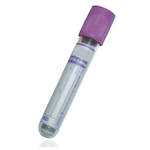Suitable Specimen Types
- EDTA Whole Blood
Turnaround Time
22 daysSample Stability
Freshly drawn specimens (whole blood) may be held at 2 to 30°C for up to 6 hours prior to centrifugation. Plasma samples are stored for 2 years at -20°C.HIV-2 Genotypic resistance testing (protease and reverse transcriptase region and optional integrase sequencing)
General Information
Genotypic HIV-2 resistance testing is the current recommended method for determining drug resistance in HIV2 infection. Genotypic resistance data provides information on the presence/absence of drug resistance mutations, which is used as a predictor of virological response to therapy. This aids clinical decisions regarding therapy changes. Choosing the most appropriate therapy regime improves patient management and reduces the cost of care.
The methodology for genotypic HIV-2 resistance testing involves extraction of RNA, reverse transcription of RNA to DNA in a one-step RT-PCR and nested PCR amplification, population sequencing and sequence analysis.
Patient Preparation
For taking blood samples we recommend that users follow either their local protocols or “The Royal Marsden Manual of Clinical Nursing Procedures”.
Lavender top blood (EDTA) sample
- Sufficient blood for the test should be drawn into lavender topped (EDTA) vacuum tubes
- Invert tube 8–10 times.
HIV-2 testing is available on our request form from the following link HIV RESISTANCE REQUEST FORM
Notes
Integrase resistance testing is performed upon request
Specifications
- EQA Scheme?: No
